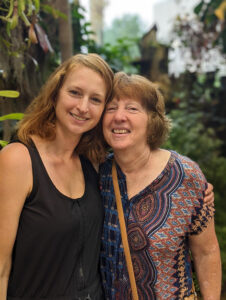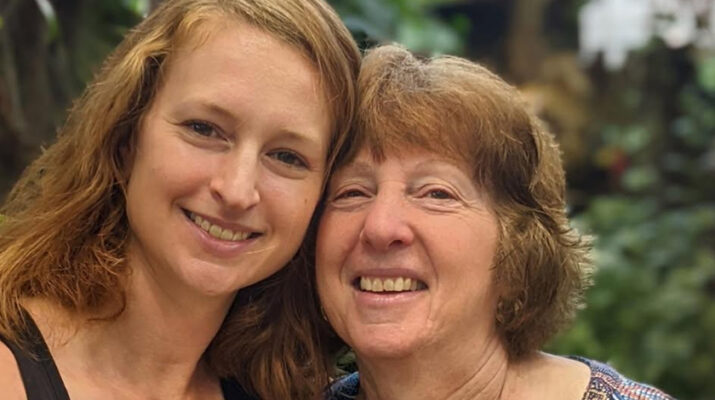Melanie Geiger, trained as a physician assistant, is one of her mom’s main caregivers
By Deborah Jeanne Sergeant

For Melanie Geiger of Walworth, caring for her mom, Pattie Miles, is second nature.
A physician assistant at UR Strong Memorial Hospital, Geiger is in the field of caring.
At present, her mom’s Alzheimer’s diagnosis means she needs a little more assistance. It helps that Geiger and Miles live just two houses away from each other and that Geiger’s dad, Mitch Miles, can keep an eye on things day to day.
About five years ago, Geiger noticed signs of cognitive decline in her mom. It’s been three and a half years since lab testing confirmed the diagnosis.
However, “she still remains pretty independent,” Geiger said. “Our situation is unique in the sense that she is still very independent and capable and very much lives her life. She drives and has a robust social network. Other people hear an Alzheimer’s diagnosis and think of the end of the disease. With our technology and what medicine is today, it isn’t that. The stigma needs to be broken. It is a chronic disease. There’s light at the end of the tunnel for people who are beginning to show characteristics. We need to show up in the way our loved ones need us to show up.”
The way Geiger shows up is acting as the liaison for Miles’ appointments. She helps her mom understand what’s going as well as keep her feeling active. Geiger has five young children, so every day her mom comes over to “help” with the children by playing with them and assisting in getting them ready to get on the bus. Even if it takes longer and makes more work for Geiger, the activity keeps Miles engaged and “she absolutely loves it,” Geiger said.
Sometimes, Miles asks Geiger the same question several times a day. But Geiger reminds herself that “she’s not trying to get under your skin. It makes you feel bad expending this negativity and makes her feel bad.”
Miles carries genetic predisposition for Alzheimer’s. Geiger has helped her mom make lifestyle modifications to help mitigate effects of the disease, such as physical exercise and improved sleep quality.
“We’ve optimized everything we could to support her with sleep apnea,” Geiger said. “We have it under control. We try to work up a patient to see if other factors are contributing to their decline.”
Alzheimer’s is a complex disease and treating sleep apnea with a nerve stimulation device prevented Miles from trying Lecanemab, a monoclonal antibody treatment for Alzheimer’s.
“It’s good to have awareness of the risk and benefit,” Geiger said. “You have to optimize a patient but there’s need for risk awareness. You can’t look at it through the lens of a specialist. If there’s a risk for a diagnosis of Alzheimer’s, they need to pause if that treatment could limit the treatment for Alzheimer’s. She could have the device removed, but anesthesia is a big risk for someone who’s frail and has cognitive decline.”
In addition to helping Miles manage her medical situation, Geiger also acts as a sounding board for her mom.
“I talk with her on the phone during my commutes, even though she was there in the morning with my kids,” Geiger said. “Sometimes it’s a little rambling. It can be frustrating not knowing her reliability. She may say, ‘I’m feeling wiggly today’ and I’ll ask what it means and she says, ‘My tummy hurts.’ You have to be Sherlock Holmes.”
To help Geiger’s father, her husband and nanny also pitch in with keeping Miles happy and busy. Miles also has a big network of friends at church.
Understanding Alzheimer’s has helped Geiger more than anything else.
“They don’t want this to happen and aren’t doing this to be annoying,” she said. “Give them the benefit of the doubt. Have some really hard thoughts and ideas that it’s OK now, but don’t bury your head in the sand. Think of needs you’ll have later on. We’ve talked about things on her bucket list and what she wants and doesn’t want in her care at the end of life. Make sure that all of that is taken care of while you still have the chance to and the mind to have those conversations.”
Geiger is also taking time to snap photos and record videos of her mom with Geiger’s young children to ensure they will be able to see how much their grandma loved them.
“My youngest are twins who are 3 and they’re having memories formed,” Geiger said. “They won’t remember like my oldest. I want to show them on videos how special they are to her. When it is hard, you can look back on it and say, ‘She’s still there.’”

